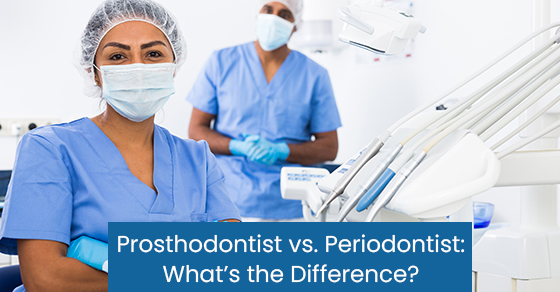If you have a complex oral health issue, you will likely be referred to a dental specialist. There are many kinds of dental specialists, each of which has undergone advanced training in a specific aspect of dentistry. They have the right knowledge and skillset to get your smile back on track, no matter your problem.
Prosthodontists and periodontists are two types of dental specialists. Although they perform some of the same procedures, such as tooth extractions, these specialists have very different areas of expertise.
In this article, we will explain the key differences between prosthodontists and periodontists. We’ll also cover when you should see one versus the other.
What is a prosthodontist?
Prosthodontists are trained to handle complex dental and facial issues. They specialize in the restoration and replacement of missing and damaged teeth. In addition, prosthodontists treat temporal-mandibular joint (TMJ) problems, sleep disorders, mouth anomalies, and traumatic injuries to the mouth and neck. Reconstructive work, such as full mouth restorations, are also performed by prosthodontists.
Furthermore, prosthodontists provide certain cosmetic dentistry services that can transform the aesthetics of your smile. At Bristol Dental Clinic, we create natural-looking restorations that improve your smile’s appearance and functionality.
Your prosthodontist is also responsible for the accurate diagnosis of oral conditions and the maintenance of your natural teeth.
All prosthodontists have advanced training in the restoration and replacement of teeth. Unlike general dentists, they undergo an additional two to three years of study after undergraduate school and dental school.
What does a prosthodontist do?
Prosthodontists perform a wide variety of procedures, ranging from simple crown implants to more complex oral reconstructive work.
Restoration and Replacement
- Crowns
- Bridges
- Implants
- Inlays and onlays
- Complete and partial dentures
Your prosthodontist at Bristol Dental Clinic completes full restorations of broken, decayed, worn, discoloured, and crooked teeth. They specialize in the proper fit and placement of crowns, bridges, and dentures. This ensures maximum comfort and functionality. Many of these procedures also have cosmetic applications.
Jaw and Sleep Issues
- TMJ (temporal-mandibular joint) problems
- Treatment for sleep and snoring disorders
Seeing a prosthodontist can help if you have a sleep disorder like sleep apnea or snoring. Additionally, they can treat temporal-mandibular joint problems.
Oral Reconstruction
- Repairs from traumatic injuries
- Oral cancer reconstruction
- Full mouth restoration
Prosthodontists specialize in oral reconstruction work to restore the functionality of the mouth. Consequently, you may need to see a prosthodontist if you have damaged your teeth in an accident or had a traumatic injury.
Alternatively, you will likely be referred to a prosthodontist if you have undergone surgery to remove a cancerous growth. Oral cancer reconstruction surgery repairs both appearance and functionality.
Full mouth restoration repairs chronic dental issues in the mouth. It uses restorative, neuromuscular, and cosmetic procedures to restructure your teeth, restore your gums and jaw, and correct your overall mouth structure. This treatment addresses everything from damage due to teeth grinding, bite problems, severe gum recession, and misaligned teeth.
What is a periodontist?
Periodontists specialize in the prevention, diagnosis, and treatment of oral health conditions that affect the gums. For example, a periodontist treats oral inflammation, gingivitis, gum disease, and advanced periodontitis. They also perform surgical treatments, as well as standard cleaning procedures.
A periodontist completes the same undergraduate and dentist school training as general dentists and prosthodontists. Afterwards, they attend a specialized training program for three years.
What does a periodontist do?
Periodontists perform non-surgical and surgical procedures that treat gum conditions. They also perform deep cleanings and examinations.
Periodontal Maintenance
Periodontists perform two specific procedures for periodontal maintenance: scaling and root planing and examinations (x-rays).
Scaling and root planing is a type of deep dental cleaning. This procedure cleans underneath the gum line, removing bacteria that is otherwise impossible to reach. It addresses infection at the root of the tooth. In addition, your periodontist smooths the surfaces of your teeth roots to make it harder for plaque and bacteria to build up.
Periodontists also examine the pockets around your teeth for signs of infection. They take x-rays or probe between the teeth and gums.
Periodontal Surgery
There are several different kinds of surgical procedures that are administered by a periodontist. Some examples of them include the following:
- Periodontal pocket reduction surgery
- Gum grafts
- Root canal therapy
- Tooth extractions
- Bone grafts
- Surgical crown lengthening
- Dental implants
Additionally, periodontists offer many surgeries to eliminate disease and restore the full function of the mouth. Pocket reduction surgery (also called gingival flap surgery) treats moderate to severe gum disease by removing infections deep beneath the gum line.
Gum grafts treat gum recession, and dental bone grafts are used to regenerate bone that has been eroded due to periodontal infection. Surgical crown lengthening makes it possible to place a crown even when a tooth breaks near the gum line.
What are the differences between prosthodontists and periodontists?
Although both prosthodontists and periodontists undergo further training in addition to dental school, they specialize in different areas of oral healthcare.
Prosthodontists specialize in the restoration and replacement of missing and damaged teeth. This includes the placement of dental implants, crowns, bridges, and other dental prostheses like dentures.
Periodontists, on the other hand, specialize in the diagnosis, prevention, and treatment of gum conditions. They treat gum disease, oral inflammation, and other infections of the gums with specific cleaning techniques and surgeries.
Essentially, a prosthodontist repairs damaged teeth, whereas a periodontist treats diseased and infected gums.
That being said, both prosthodontists and periodontists can perform dental implant surgery. If the tooth loss was caused by gum disease, you should see a periodontist. Alternatively, you may be referred to a prosthodontist if you lost a tooth in a car accident or sports injury.
Should you see a prosthodontist or a periodontist?
The answer depends on the nature of your oral health issue. After all, prosthodontists and periodontists have different areas of expertise.
When to See a Prosthodontist
If your teeth have been damaged because of an accident, injury, or decay, you will likely be referred to a prosthodontist. Your prosthodontist at Bristol Dental Clinic can restore the appearance and functionality of damaged natural teeth or replace missing teeth with implants or dentures.
When to See a Periodontist
You should see a periodontist if you have gingivitis, gum disease, or oral inflammation. Periodontists provide specialized dental treatments to combat gum infections and restore gum health.
Visit a Prosthodontist at Bristol Dental Clinic in Mississauga
A prosthodontist is ready to help at Bristol Dental Clinic. Our team of trained and experienced dentists offers a wide range of options to restore or replace your natural teeth. We specialize in diagnosis, treatment planning, and prevention of oral health conditions and tooth loss.
To find a prosthodontist in Mississauga, call Bristol Dental Clinic at 866-673-2109 or contact us here.





